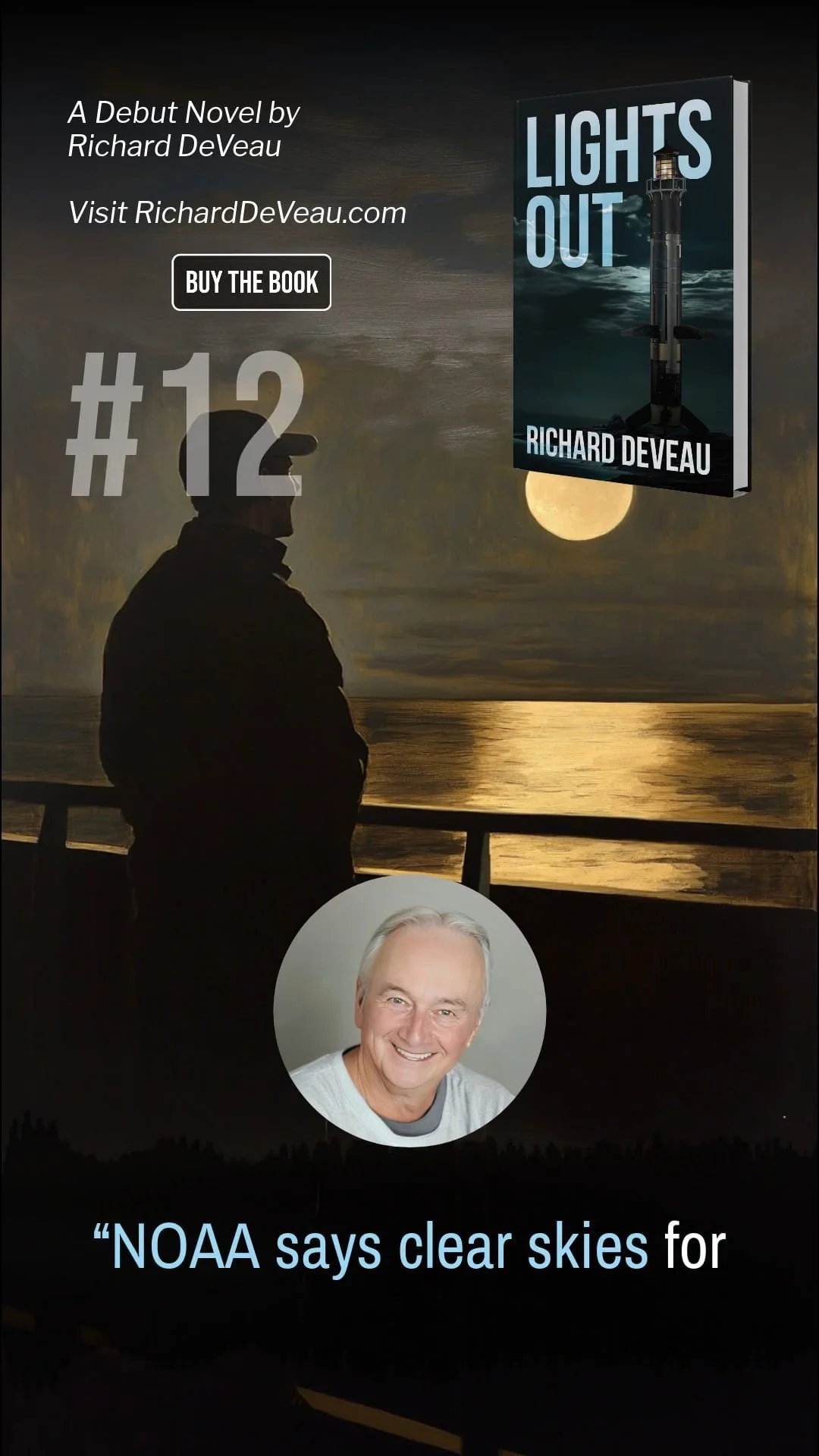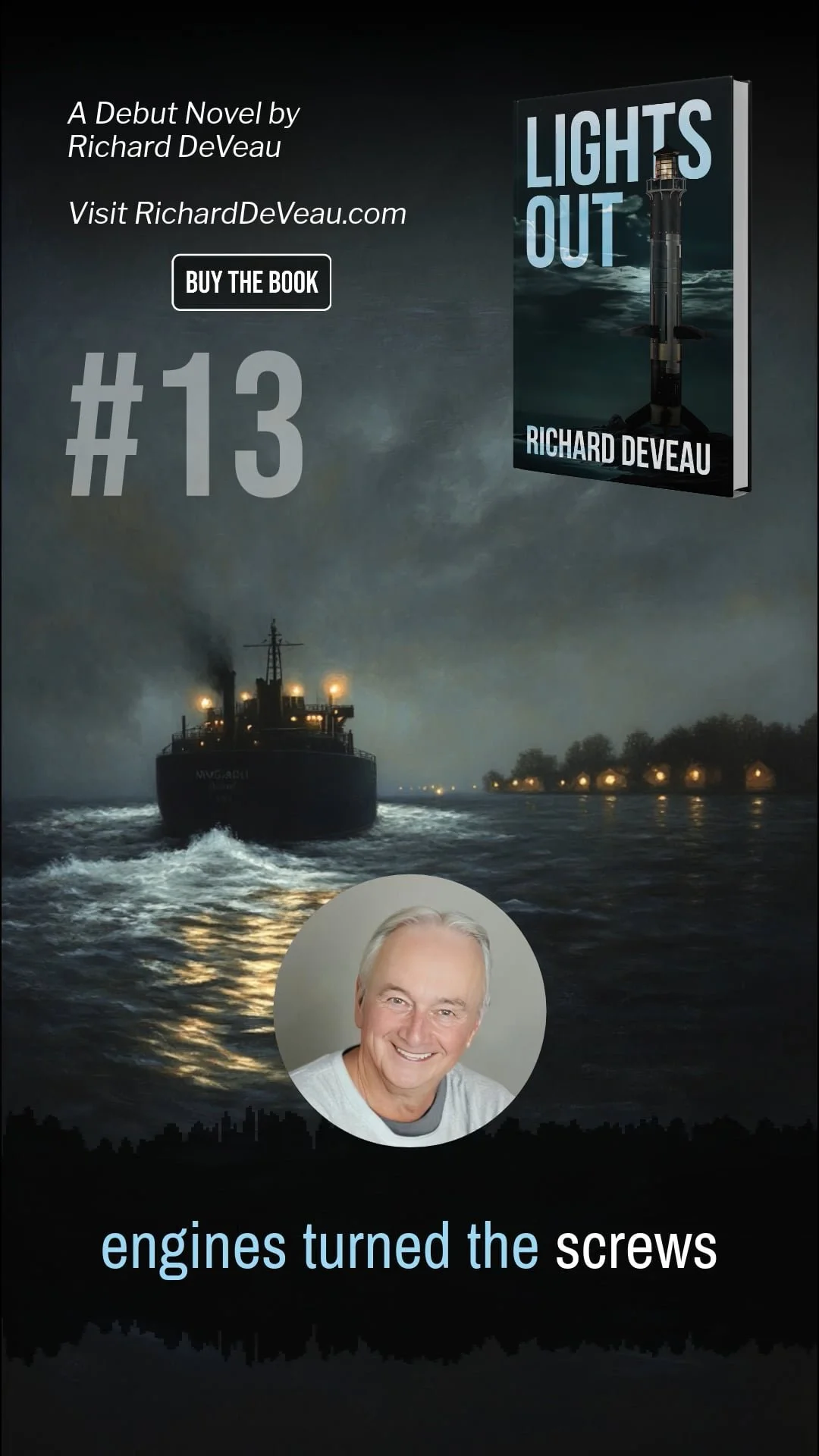
Novelist · Painter · Creative Director
In Richard DeVeau’s gripping debut novel, the serene landscapes of Door County, Wisconsin and the vast expanse of Lake Michigan become the opening scene in an explosive tale of deception, high-stakes political conspiracy, and domestic terrorism.
With vivid prose and heart-pounding suspense, this is a masterfully woven thriller filled with intrigue, surprising plot twists, and compelling characters.
Think Tom Clancy meets Ken Follett meets Paul Auster.
Prepare to be grabbed by the collar from the first sentence and not released until the last period.
A retired couple are murdered in their Wisconsin home—art and other valuables are stolen. A Lake Michigan oil tanker explodes and sinks that same night.
Eve Tuant—special forces veteran, CIA officer, and leader of Boston’s Homeland Security team—believes there is a connection between these two events.
She and her team quickly find themselves in pursuit of a domestic terrorist—an MIT-educated, military trained missile genius with Ted Bundy-like psychopathy—to stop him before he carries out his next devastating attack. This one even more lethal than the overwhelming inferno he just unleashed on Greater Boston.
As Eve closes in, she discovers these attacks are orchestrated by a US senator and a powerful cabal of highly placed leaders and lawmakers with a hidden agenda.
-
“LIGHTS OUT will keep you on the edge of your seat.”
F.Z.
-
“Taut thriller, great characters, all kinds of twists, turns and surprises.”
B.E.
-
“Very Tom Clancy like.”
A.G.
-
“Had a difficult time putting it down.”
R.B.
-
“It was a real page turner.”
J.K.
-
“Reminded me of The Pelican Brief in terms of intrigue and terror.”
B.B.
-
"Love the character development—especially the heroine, Eve!"
D.H.
-
"If you like Clancy or Ludlum, you'll definitely enjoy LIGHTS OUT. 5 stars! 2 thumbs up!"
D.H.
-
"I got nervous at several points and had to skip ahead, just to see what was going to happen."
B.E.

#1
He looked like any other tourist. Or to be more precise, like any other sport fisherman you’d see driving north on Route 42 in Door County in late October.
His pickup truck’s camping cap enclosed the back cargo bay, dark-tinted windows reflected the passing landscape. An olive green, twenty-foot aluminum outboard motorboat rocked and bounced on its trailer.
His straight-out-of-an-L.L.Bean-catalog outfit, right down to the multi-pocketed fishing vest and wide-brimmed hat with lures and flies hooked into the band, completed the ruse.
Since he never listened to the radio, no matter how long the drive, his phone’s GPS broke the silence and told him to take a right onto Isle View Road and head east.
As the movie in his mind’s eye played a loop of his task and all its possible contingencies, he barely noticed the maples, birches and oaks scantily dressed in pale, late-autumn reds, yellows and browns. He paid no attention to the scuffling rustle of dried leaves his truck kicked up in its wake.

#2
Searching house numbers on this sparsely populated, heavily wooded road, his heart rate picked up. At the correct mailbox, he took a deep breath and exhaled as he headed into the long, winding driveway that ended in a large circle in front of a meticulously manicured fieldstone colonial, past the front door and parked near the attached three-car garage to the left.
After pulling on a pair of rubber surgical gloves, he reached under his seat for a Beretta M96, removed the thread protector from the barrel and screwed on the silencer, nearly doubling the eight-inch gun’s length. He racked the slide, putting the first of twelve forty-caliber rounds into the chamber.
As he got out of the truck, he slipped the weapon into his belt in the middle of his back and then reached for a map in the driver door’s pocket. Heading quickly toward the door, yellow light from the windows spilled onto the gray paving-stone driveway, a slight breeze carried the earthy scent of decaying leaves, he unfurled the map and pressed the doorbell.

#3
He figured it would be Mrs. Abrams who would answer, and he was right. As she opened the door, a quizzical look on her face, he smiled his broadest smile and said, “I hate to bother you, but I appear to be quite lost and hope you can help me.” A deep man’s voice echoed from somewhere down the hallway, “Who is it, Marilyn?” “A lost fisherman.” As Mr. Abrams appeared from a doorway on the left and headed toward them holding an open newspaper in one hand, his reading glasses in the other, he said, “A fisherman you sa-” Before he could finish his sentence a hole appeared in his forehead, red mist exhausted from the back of his head as his body heaped to the floor. As the realization hit her fully, but before the scream could leave her lungs, one appeared in Mrs. Abrams’ forehead as well, splattering blood, brain and bone onto the pale beige wall directly behind her.

#4
He pushed her falling body back and quickly entered the house, closing the door behind him with his foot as he dropped the map to put both hands around his weapon and stood still. Smelling dinner’s sautéed onions, his stomach growled. Other than the ticking grandfather clock at the other end of the lengthy hallway, he heard nothing else. He went throughout the entire house checking each of its ten rooms, starting with the first floor and then upstairs. As he expected, the house was empty. He knew the Abrams lived alone. In fact, even though he had never met them before or for that matter had ever been to this Wisconsin peninsula that pierces the northwest side of Lake Michigan like a fat, lowercase letter i, he knew everything there was to know about the Abrams. Both fifty eight years old. Married for thirty years. No children. He was a Chicago ad agency executive who had done well building up and then selling his agency to a French communications conglomerate, enabling him to retire early.

#5
Captain Dunn watched the setting sun paint bulbous, slate-gray clouds with lucid shades of violet, pink and orange as he deeply inhaled the lake’s familiar scent—part wind, part fog, part fish. Even though he had been making the same run between Canada and Chicago for nearly thirty years, he never tired of views like this from the bridge of his oil tanker. He knew every square inch of Lake Michigan almost better than the freckles on his wife’s nose. But he never allowed the familiarity to tempt him into complacency.
He knew all too well that Lake Michigan can be just as dangerous as the open ocean in a storm. Navigating it in any sized vessel demands respect and vigilance. He had faced gale-force winds blowing twenty-four-foot waves across his bow, pummeling his ship with its sixty-pounds-per-square-foot fists.

#6
His oil laker, the Blue Nexus, was carrying more than eighty thousand gallons of dyed diesel fuel in its tanks, heating oil headed to Chicago homes and businesses to buffer the approaching winter. This was the Captain’s tenth vessel to command. Over his career he’d served on ships hauling limestone, iron ore, corn, coal, sand and salt to nearly every one of the sixty-three ports that dot this Great Lake. He had the oil pumped into the ship’s six tanks at a port in Ontario. While in port, his seasoned twenty-man crew took care of the transfer operation, taking on eighty-three-thousand gallons of oil without spilling a drop, as well as refueling and restocking the vessel with the food and supplies they’d need for the next two weeks. It was here in Ontario that something extra was surreptitiously added to his ship, something that he knew nothing about—a small GPS transmitting unit was attached to the mid-ship hull.

#7
Once down the stairs and back into the hallway, he stepped around Mr. Abram’s body, carefully avoiding the expanding pool of blood. He retrieved and refolded his map and stuck it in a vest pocket as he entered the living room. Plopping onto the sofa, he placed his gun next to him and pulled out a second phone, opened its back and inserted the battery. He swiped his apps, scrolled to Twitter and typed, “The lake is peaceful this time of the year. Will fish be biting tonight?” He left the phone on the cushion, headed into the kitchen. He returned with a ham and cheese sandwich on a plate and a glass bottle of Perrier as his phone chimed. Placing these items on the coffee table in front of him, the Tweet read, “A cleansing rain is expected at the lake.” He powered it off, removed the battery, tucked them into a vest pocket, took a large bite of the sandwich and a big pull of sparkling water.

#8
He went through the house one last time making certain he didn’t forget anything or leave any obvious evidence. Satisfied that all was in order, he closed the front door behind him, and drove the pickup around to the back of the house, which faced the lake. He backed the truck and trailer down the Abram’s boat ramp, which ran alongside a thirty-foot wooden dock. To the left of the dock, nothing but acres of dark woods against a darkening sky as far as the eye could see—the Abram’s property bordered Newport State Forest. Once the trailer and boat were partially in the water, he got out, went to the trailer, turned the clicking hand winch to the right until the boat floated free, unlatched the cable line, and in one graceful motion shoved off with one foot and jumped in. He clambered to the center steering console, brought the burbling Mercury to life, pushed the throttle lever to full as he turned the boat 180-degrees and headed east. He left the running lights off, the dark green boat nearly invisible in the moonless night as it sliced through the cold, black water.

#9
The three-mile path to Pilot Island was clearly marked by the steady sweeping beat of the lighthouse’s beam. Twenty minutes later, the boat tied to the island’s dock, he lifted the military crate, slid it onto the dock and hopped out after it. He pulled a headband flashlight out of one of his vest pockets, stretched the rubber strap over his head and switched it on. Picking up the case with his left hand, leaning against its weight, he pulled his still-silenced Beretta from his belt. At the end of the dock, a crushed-stone path led up a slight hill to the lighthouse, twenty yards away. He knew it had been automated more than fifty years ago and was now unmanned, like nearly every other operational lighthouse today, and he didn’t anticipate anyone being there. But he was taught, “Ready always. Assume nothing.”

#10
Once he got to the door, he went to work on the lock with a pick set he pulled from a vest pocket. Just under two minutes later he opened the door and entered with his gun ready, the light from his headlamp inline with his pointed weapon. He quickly determined that the house was indeed unoccupied, confirmed by the layers of dust he illuminated everywhere he turned, by the entombed silence, and the powerful musty smell of moldy, long-undisturbed dampness. He put the gun into his belt as he went back outside to retrieve the case and close the door. The light tower was at the other end of the room where he proceeded to climb the winding spiral staircase. Even using both hands, the strain of his more than one-hundred-pound load increased as he went and he bumped the case against the wall a few times.

#11
He entered the service room, just below the lantern room, stepped through the door onto the metal grated, railed deck and stopped mid-step, noticing that wherever his light hit the grate and railing, he saw more rust than metal. Gingerly bouncing and testing it with his weight, he then slowly stepped to the left a few more feet so that he was facing the wide-open lake to the east, then gently put the case down with a grunt of relief. After stretching his back, he turned off his headlamp, since the light spilling from the beam spinning fifteen feet above his head provided plenty of illumination. He kneeled and opened the case, removed an FGM-148 Javelin anti-tank missile launcher, lifted the ranging sight assembly box from it’s perfectly-shaped foam rubber bed and attached it to the tube of the shoulder-launched weapon. He then carefully removed one of the two missiles, inserted it into the launch tube and then placed the weapon onto the deck.

#12
Captain Dunn was in the pilothouse checking course settings once again with his pilot at the helm, Jim Baker. Jim and the captain have been serving together for more than twenty years. There’s no better pilot to be found in all five Great Lakes as far as the Captain was concerned. And no better friend. He said, “Looks like we’re gonna’ have a week of good weather, Jim.” Without turning around, Jim replied, “NOAA says clear skies for most of the next two weeks. We’ll see. NOAA isn’t God.” “Well, they think they are.” “Someone should tell ‘em they only forecast the weather, they don’t make it.” “Sure. But do we ever move without consulting them? Kinda makes them at least god-like. God adjacent?” Noting the south by slightly southwest heading, and before turning and stepping through the open door onto the stern deck, Dunn started singing. “NOAA loves me, this I know. Cuz’ their weather reports tell me so.” “You’re off key and a bit pitchy.” The Captain usually relaxed at this point in the journey. This was one of the most open and deepest parts of the lake. The ship had just crossed the border of Michigan and was now in Wisconsin waters, although the difference was merely a dotted line on a map.

#13
As the twin V-16 diesel engines turned the screws at near full speed, the vast vessel moved at eighteen knots, about twenty miles an hour, across the relatively calm lake. He could see a few small lights from houses several miles away on the shore off his starboard side. In the distance to the south and east, the sweeping light of the Pilot Island lighthouse was growing brighter as he got closer, although five miles away was the closest he’d get. Pilot Island was one of fifty lighthouses operating along the lake’s shores and inlets that he had come to know so well. Logically, lighthouses were inanimate objects, but emotionally they had become living beings with pulsing heartbeats of light. Though no longer really needed in today’s satellite-saturated, GPS-guided world, he loved their history and the important role they played in aiding and comforting sea and lake-faring folk like him.

#14
His app indicated that the ship was just about at the desired location, so he powered the phone off and picked up the missile launcher and placed it onto his right shoulder. Peering into the sight, he set it for night vision, pressed the power button, starting a low-buzzing hum of electronics and lighting up the targeting box and range finder, instantly locking onto the ship. He selected the direct-launch mode option, watched the digital display track the ship for three more seconds, took a deep breath and pulled the trigger. The four-foot missile shot out of the tube several feet, propelled by its compressed gas cylinder, the main engine ignited a fraction of a second later in a pale-blue burst of solid-fuel-propelled flame, sending the howling missile toward its target at nearly five-hundred feet-per-second.

#15
Captain Dunn was standing on the bridge’s deck sipping his coffee when he noticed something odd as he looked toward Pilot Island off to his right—a flaming light seemed to detach itself from the lighthouse, heading toward him at an alarming speed. Had he known that his life and his crew’s would end in the next minute, he probably would have at least been thinking of something other than his last round of golf. As the realization struck him, wide-eyed, he turned to face the open pilothouse door and said, “Jim, I think we’re about to meet NOAA.” As the missile streaked away, momentarily warming him, he took his eyes off the sight, moved the case closer for easier access to the second missile. The smell of burning lighter fluid and sulfur lingered in the slight breeze. Like the first, the second missile still in the case was also modified to double its normal three-mile range and it too was armed with an extra nasty, two-phase armor-piercing and incendiary warhead. Both modifications he did himself. He could load the second missile into the tube and be ready to shoot in under twenty seconds.

Contact Me
~colors
ctas: #f4b900
headlines: #ffffff
copy: #cccccc
pagebackground: #000000


















